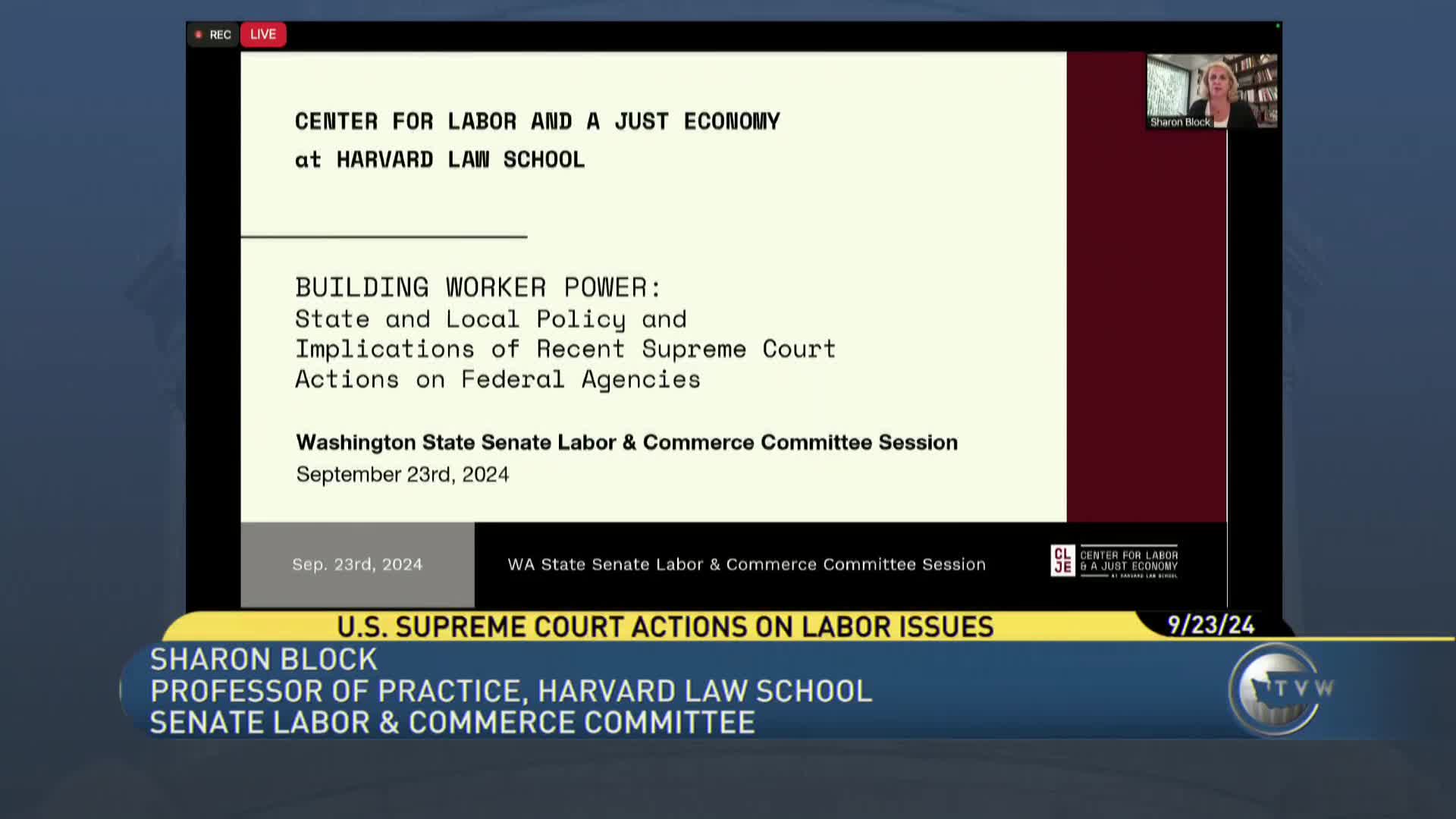State Action Emerges as Key to Worker Protections
September 23, 2024 | Labor & Commerce, Senate, Legislative Sessions, Washington
This article was created by AI summarizing key points discussed. AI makes mistakes, so for full details and context, please refer to the video of the full meeting. Please report any errors so we can fix them. Report an error »

In a recent government meeting, officials discussed the challenges of advancing comprehensive labor law reform at the federal level, acknowledging that significant changes are unlikely in the near future. Instead, the focus has shifted to state and local initiatives aimed at empowering workers and enhancing labor rights.
Sharon, a key speaker, emphasized the importance of collaboration among policymakers, advocates, and labor organizations to explore effective strategies at the state level. This approach is seen as a necessary response to the stagnation of federal labor reforms.
Professor Benjamin Sachs provided a legal framework for understanding federal labor preemption, which restricts state intervention in certain labor-related areas. He outlined three primary zones where state policymaking is limited: activities regulated by the National Labor Relations Board (NLRB), areas intended for market freedom, and damages and remedies related to labor law violations. However, he highlighted critical exceptions that allow states to act, particularly concerning workers not covered by federal law, state actions as market participants, and the establishment of minimum standards.
Sachs noted that states have the authority to create labor protections for public sector employees, agricultural workers, and potentially gig workers. He also discussed how states can engage in market participation, citing examples where state-funded projects required labor peace agreements to ensure cooperation between employers and unions.
Senator Conway raised questions about the implications of state financing on labor standards, suggesting that state involvement in capital projects could provide opportunities for enhanced labor protections. The discussion underscored the potential for states to implement innovative labor policies, such as worker boards that set industry-specific minimum wages, as seen in California and Minnesota.
Overall, the meeting highlighted a strategic pivot towards state-level action in labor reform, recognizing the limitations of federal efforts while exploring avenues for meaningful progress in worker rights and protections.
Sharon, a key speaker, emphasized the importance of collaboration among policymakers, advocates, and labor organizations to explore effective strategies at the state level. This approach is seen as a necessary response to the stagnation of federal labor reforms.
Professor Benjamin Sachs provided a legal framework for understanding federal labor preemption, which restricts state intervention in certain labor-related areas. He outlined three primary zones where state policymaking is limited: activities regulated by the National Labor Relations Board (NLRB), areas intended for market freedom, and damages and remedies related to labor law violations. However, he highlighted critical exceptions that allow states to act, particularly concerning workers not covered by federal law, state actions as market participants, and the establishment of minimum standards.
Sachs noted that states have the authority to create labor protections for public sector employees, agricultural workers, and potentially gig workers. He also discussed how states can engage in market participation, citing examples where state-funded projects required labor peace agreements to ensure cooperation between employers and unions.
Senator Conway raised questions about the implications of state financing on labor standards, suggesting that state involvement in capital projects could provide opportunities for enhanced labor protections. The discussion underscored the potential for states to implement innovative labor policies, such as worker boards that set industry-specific minimum wages, as seen in California and Minnesota.
Overall, the meeting highlighted a strategic pivot towards state-level action in labor reform, recognizing the limitations of federal efforts while exploring avenues for meaningful progress in worker rights and protections.
View full meeting
This article is based on a recent meeting—watch the full video and explore the complete transcript for deeper insights into the discussion.
View full meeting
